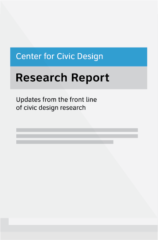ElectionGuard in College Park, Maryland
What do voters want to know before they use new election technology? What kind of questions do they have and expect to be answered?
Over several years, we have conducted research to learn about the pain points and opportunities in introducing ElectionGuard, an open-source software that improves confidence and participation in elections. The voting verification system works by creating a second, encrypted, copy of every vote as it cast on the ballot scanner. Voters can check that their ballot was counted. ElectionGuard also makes it possible to check the results of an election without revealing how anyone voted.
In 2023, ElectionGuard was used in City of College Park, Maryland’s city elections. We worked on communications materials and conducted research into how ElectionGuard works in the context of a live election.
Overall, voters responded positively to the new technology, though there was also some skepticism. We learned that as people encountered ElectionGuard for the first time, many did not realize anything was different about the election. The scanner was the most visible change they noticed and voters found the ability to verify that their vote was counted reassuring, transparent, and useful.

ElectionGuard in College Park City Elections in 2023: A report on the implementation and voter reactions
This research was done in collaboration with the University of North Carolina, Charlotte. They conducted a survey to assess attitudes about ElectionGuard as well as election administration in College Park. Download a report of the survey results.
Download reportKey findings
To learn how voters interacted with ElectionGuard, we conducted in-person interviews and collected insight from a post-election survey.
What we learned from exit interviews
Many voters did not immediately realize anything was new in this election. The scanner review screen was the most visible – and positive – feature. Voters found the ability to review their ballot before casting it reassuring, transparent, and useful. Even though it was an extra step in the voting process, it confirmed that the voting system read their ballot as they intended. Voters mentioned this as both a personal benefit and as part of election integrity.
Our other findings centered around how people had or hadn’t come to learn about ElectionGuard. Many people had not heard about this new technology even though they considered themselves well-informed about elections. The most common sources of information were:
- Other people, primarily candidates or neighbors
- Official College Park communications, including newsletters, meetings, web, social media, voter cards, and mail
- Email lists or social media, including the Mayor’s emails, Facebook and other lists
On election day, every voter received a pocket guide about ElectionGuard while waiting in line. But we found that most of the people first found out about the technology when a poll worker explained it to them. The line was often too short for them to read the handout.
Most of the reactions to ElectionGaurd were positive, though there were some concerns.
“This [the Confirmation Code] makes me feel like my vote was counted.”
– Quotes from voters
“It’s great, adds more voter security.”
“It ensures transparency. It’s guarding the election. People complain about votes
not counting. This should boost confidence.”
“I believe in the machines and voting. I’m not real skeptical [so am not sure] that
it’s necessary.”
What we learned from a post-election survey
According to the survey respondents, the most important features of ElectionGuard were that “Each voter can confirm that their ballot was counted” (78%) and “Voters themselves can test that the system is recording votes accurately” (68%).
We also found discrepancies in how people responded to the survey and their actual behavior. ElectionGuard allows you to run a test called “BallotCheck” to confirm your vote was counted. When asked if they did “BallotCheck” 13% of participants said yes. But only 4 respondents reported going to the website to complete the BallotCheck and see if their ballot selections were recorded correctly.
About the research
This research was conducted by Whitney Quesenbery, Lynn Baumeister, Misty Crooks, Sean Isamu Johnson, Fernando Sanchez and Tasmin Swanson in November 2023, supporting a trial of ElectionGuard in the College Park, Maryland, city elections.
How we conducted exit interviews on election day
- We conducted 263 in-person intercept interviews with a total of 307 people (some were with people who had come to vote together and agreed to talk to us together) during 3 days of voting at 3 locations in College Park with a small team. As voters left the polling place, we asked if they had a few minutes to talk. Interviews took 5-10 minutes, depending on how much the voters had to say.
How we collected insight through a post-election survey
- The final research was a post-election feedback survey which was available online from October 4 – November 30. The survey included both questions about the voting experience and general questions about College Park elections. There were 230 responses from College Park residents. 180 of them reported having voted in the election, with 41 who said they did not vote. Unlike the interviews at the Early and Election Day polling places, the survey included both people who voted in person and with a mail ballot.
Related resources
ElectionGuard is housed in the Elections Technology Initiative and integrated into the Hart InterCivic Verity Scanner. The software is developed by InfernoRed Technology, Microsoft, and Enhanced Voting. MITRE National Election Security Lab created the first Independent Verifier. Learn more at electionguard.vote/
For key findings from a trial of ElectionGuard in Idaho in November 2022, you can read our article communication and voter education is key to election innovation
Read a full report on the use of ElectionGuard and Hart InterCivic’s Verity precinct-scan voting system describing how the pilot was conducted and its results: End-to-End Verifiability in Real-World Elections

